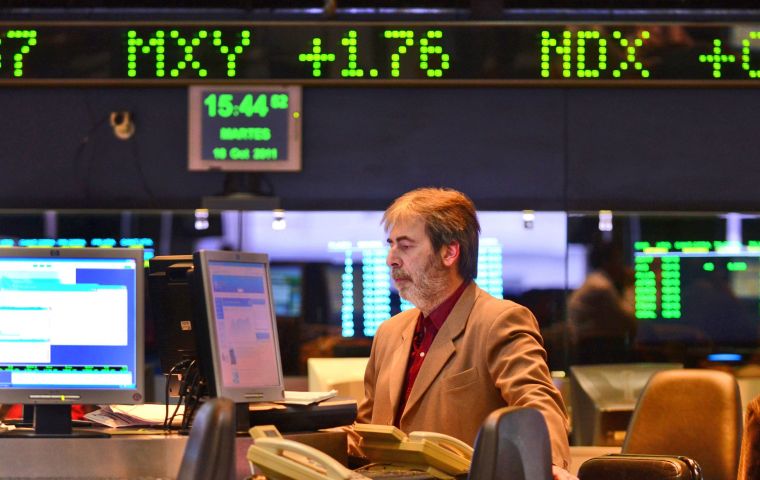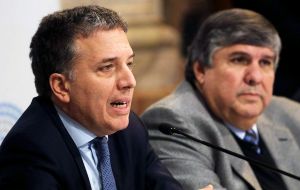MercoPress. South Atlantic News Agency
Argentina reveals financial needs; stock market and the Peso rebound
 Stock markets rebounded, with benchmark Merval stock index closing up 7.38% on Tuesday. Bonds were also higher, with over-the-counter bonds up 1%
Stock markets rebounded, with benchmark Merval stock index closing up 7.38% on Tuesday. Bonds were also higher, with over-the-counter bonds up 1%  According to the presentation, the government needs to issue new debt equivalent to US$ 1.2 billion for the remainder of 2018
According to the presentation, the government needs to issue new debt equivalent to US$ 1.2 billion for the remainder of 2018 Argentina will need to raise a net US$ 8 billion in the domestic debt market in 2019 to meet financing needs that include a US$ 7.4 billion primary deficit and US$ 25 billion in debt principal and interest payments, according to a Treasury Ministry document.
Argentina will use US$ 11.7 billion from its US$ 50 billion credit line with the International Monetary Fund (IMF) in 2019 and US$13.4 billion between July and December 2018, according to a presentation to investors by Treasury Minister Nicolas Dujovne to investors published on Tuesday.
It will raise US$ 3 billion in international markets, all to cover maturing debt, according to the presentation.
The Peso currency rose for the second straight session on Tuesday following a sharp drop last week, bolstered by a surprise hike in bank reserve requirements by the central bank. A run on the Peso in recent months prompted the government to turn to the IMF for funding.
Stock markets also rebounded, with the benchmark Merval stock index closing up 7.38% on Tuesday. Bonds were also higher, with over-the-counter bonds up 1%, on average.
According to the presentation, the government needs to issue new debt equivalent to US$ 1.2 billion for the remainder of 2018.
Argentina announced on Monday that it would sell one-year, dollar-denominated Treasury notes, though it did not provide an amount. On Tuesday, it delayed the deadline for investors to present their offers to Thursday from Tuesday afternoon.
Argentina may need to issue more debt than planned if it is unable to roll over all of its maturing debt this year and next year, according to the presentation.
This year’s primary fiscal deficit, which does not include debt payments, is expected at 2.7% of GDP while the shortfall including debt obligations is seen at 5.1% of GDP, according to the presentation.
The deficits in 2019 are projected at 1.3% and 3.7% of GDP, respectively, according to the presentation. The government expects a flat primary balance in 2020 and a financial deficit including debt payments of 2.3% of GDP. In 2021 the presentation projects a 0.5% primary surplus with a financial deficit of 1.7% of GDP.




Top Comments
Disclaimer & comment rules-

-

-

Read all comments”Between buying (US dollar) currency and expenses of (Argentines) travelling abroad, about 2.5 billion US dollars leave the country each month.“
Jul 06th, 2018 - 06:55 pm 0Maybe so, but there has been a net flow of money out of Argentina since 2010. https://tradingeconomics.com/argentina/capital-flows The problem didn't start in 2015. Maybe Macri isn't fixing it, but the previous administration were certainly making things worse.
“the story developing since December 2015 provides some answers”
If you look at the 10 year curve I'd conclude that the story developing since December 2015 actually shows a slow improvement between 2015 and 2017 at which point there was a sharp downward turn. I don't know the explanation for this, and Macri may well be partly to blame, but I suspect some change in mid-late 2016 is what you should be looking for.
I am simply trying to do a bit of a reality check by looking at some facts. The fact is things were bad and getting worse under CFK. Macri made some impossible claims and got elected (not the first time a politician has done this). Now, the question is has the decline under CFK now
Jul 12th, 2018 - 06:07 pm 0a) Continued at the same rate
b) Accelerated
c) Decelerated but still declining
d) Stopped and leveled out
e) Reversed or
f) Something more complicated.
People's perspective will be different and it depends which numbers you look at, but my impression is that Macri initially definitely slowed the decline and even started a slow recovery but is now declining again but I'm not sure yet how the rate of decline compares to historical values.
Would you would argue that it has been (b) all the way?
So in 2019 Argentina will need to “raise” US$ 7.4 billion to finance its primary deficit;
Jul 04th, 2018 - 03:52 pm -1The country will also need US$ 25 billion to service its current debt.
Meanwhile, Clarin, a newspaper unsuspected of opposing the government of Mauricio Macri, notes the following:
”Between buying (US dollar) currency and expenses of (Argentines) travelling abroad, about 2.5 billion US dollars leave the country each month.“
As reported above, in a presentation to investors Treasury Minister Nicolas Dujovne noted that the government ”needs to issue new debt equivalent to US$ 1.2 billion for the remainder of 2018,“ and that ”Argentina will need to raise a net US$ 8 billion in the domestic debt market in 2019 to meet financing needs.“
Not only that.
”Argentina may need to issue more debt than planned if it is unable to roll over all of its maturing debt this year and next year.“
Really.
Who's going to risk investing in a country quickly approaching financial collapse when the recent decision to call the IMF was prompted by the unwillingness of private investors to keep lending money to Argentina?
Meanwhile, Argentina's real economy continues to sink into recession as a result of Macri's economic measures.
For those wondering how a resource-rich country like Argentina cannot flourish, the story developing since December 2015 provides some answers.
It's not the ”Argentines“ who make these things happen. The current situation is, as in previous disasters, the making of a small group of rich and powerful who lied to electors and who have been bleeding the country nonstop ever since -- while keeping their assets securely stashed abroad in offshore accounts.
This is the ugly reality of ”market-friendly Macri.”
Commenting for this story is now closed.
If you have a Facebook account, become a fan and comment on our Facebook Page!